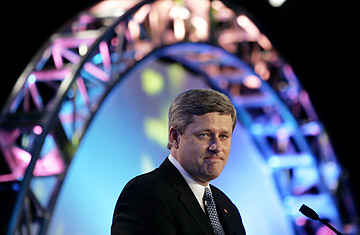
Canadian Prime Minister Stephen Harper.
The reason for Harper's response or lack thereof could be that Martel's gifts come wrapped in criticism and might be more accurately described as a guerilla publicity campaign. "This government, and especially the Prime Minister, doesn't seem to have an awareness of the importance of art and culture," Martel charges. His campaign, intended to encourage Harper's Conservative government to make the arts and arts funding a higher priority, was launched with an essay in the national newspaper The Globe and Mail, has its own website, and has succeeded in attracting considerable media attention. Many Canadians regard government grants to arts institutions and artists as essential for protecting and nurturing Canadian culture in the midst of a constant flood of American influence. "I hope this is sort of a wake-up call to him," Martel told TIME. "If it instills a certain sense of shame because he hasn't read enough, so be it. If he wakes up and enjoys some of the books that I've sent him, wonderful! I'll encourage him in that way."
Almost no one in Canada, including Harper's political enemies, questions his intelligence. If he were not in politics, he might have become an academic or policy analyst. Nor is Martel charging that Harper does not read, but the author says the endless government reports, bedtime stories the Prime Minister reads to his daughter, and even a book about hockey that Harper is writing, are not enough; Harper needs art. "I'm not saying he has to read all of War and Peace in a week, but to never be engaged in the imaginative work that is fiction, to not go to museums, to concerts, to ballets, to plays, to not engage in cultural life at all, to me, it's slightly scary," Martel says.
Harper's minority government has been holding on to most of the support it had when elected 15 months ago, but is now taking a lot of heat over its environment policies and the Canadian Forces' role in Afghanistan. And certainly, there's some work ahead to win votes in the artistic community. In April, artists and writers protested cuts to arts funding on Parliament Hill. Shortly after, author Margaret Atwood accused the Tories of being out to "squash the arts into the dust."
So far, Harper has reacted Martel's campaign with a technique that has proved quite effective during his time in power: stony silence. While his staff have countered with a list of new arts funding, including an extra C$50 million for the Canada Council for the Arts, Harper himself has not responded directly to Martel or commented in the media. A Harper spokesperson did say that the PM "reads a variety of books when he has some spare time." Martel concedes that the Prime Minister has a lot of demands on his time, but he is not willing to excuse Harper from his homework assignments entirely and notes that the two books he has sent so far are relatively short. The first, Tolstoy's Death of Ivan Ilyich, is only 60 pages.
But Martel says he's in this thing for the long haul and will send books as long as Harper is in power. "He has to respond at some point. It would be unacceptable if a Canadian citizen wrote to the Prime Minister thoughtful letters with gifts twice a month, month after month, and there was no response," Martel says, insisting that his letters (posted on his website) are not petty or partisan. He notes that previous Conservative governments, including that of Brian Mulroney, have supported the arts. But what Martel and Harper each think is "unacceptable" may be very different. Harper, who once decided to boycott the entire parliamentary press gallery after a standoff over who got to ask what questions when, seems quite capable of ignoring Martel and his books for a very long time.
But Harper is also a charisma-challenged politician who wants a majority government in the next election but has not been able to dispel perceptions that he is cold and remote. (Shortly after winning office in January 2006, newspapers showed a stiff new PM shaking hands with his young son while dropping him off at school. Now photos on the Prime Minister's website show Harper holding homeless kittens.) Canadians might sympathize with a leader who ruefully said he was too busy worrying about running the country to read many novels, but giving a popular author the cold shoulder looks, well... cold.
